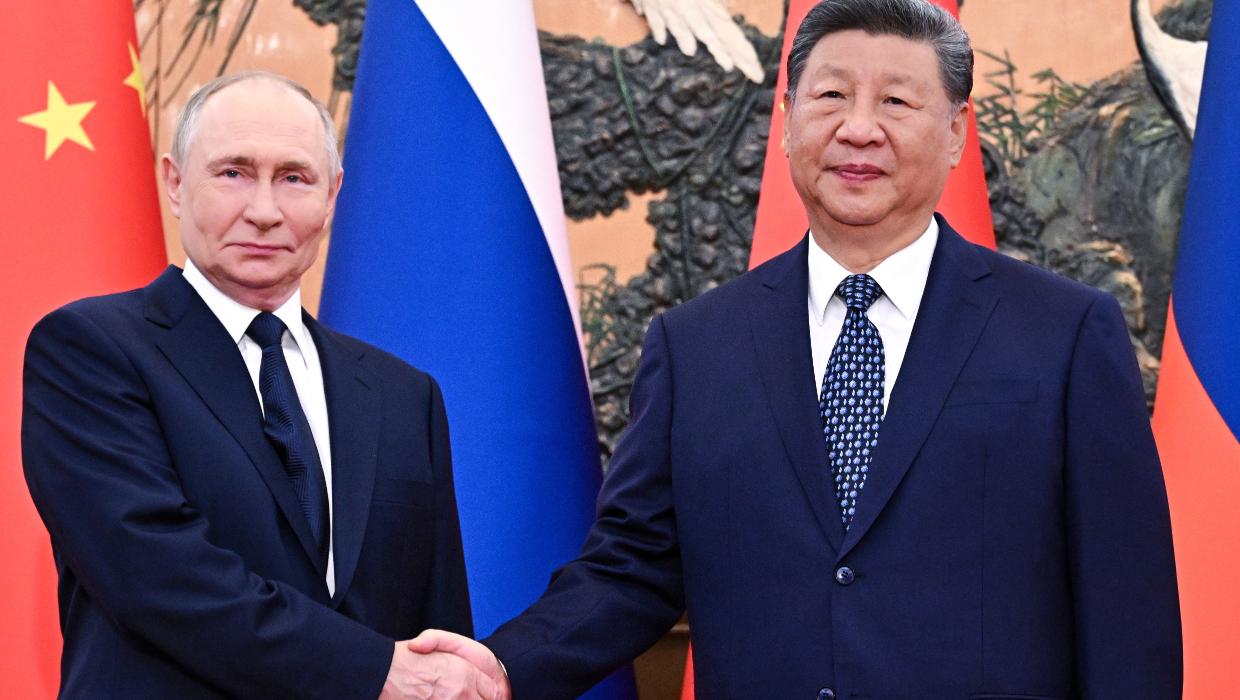Politics
Putin and Xi Jinping Strengthen Ties Amid Global Challenges

Russian President Vladimir Putin praised the current state of relations with China as “unprecedentedly high” during a meeting with his Chinese counterpart, Xi Jinping, in Beijing on October 17, 2023. This meeting comes at a time when both leaders face increasing pressures from the United States and its allies.
Putin’s remarks highlight the deepening partnership between Russia and China, which has been underscored by a series of collaborative initiatives in various sectors, including energy, trade, and military cooperation. The meeting reflects the two nations’ mutual interest in countering Western influence and fostering a united front in international affairs.
During the discussions, the leaders addressed key issues affecting their respective countries, including economic challenges and security concerns. Putin emphasized the importance of bilateral trade, which has seen significant growth, reaching approximately $200 billion in 2022. This figure represents a marked increase from previous years, indicating a robust economic relationship that both nations are eager to expand further.
Strengthening Economic and Military Cooperation
The partnership between Russia and China has evolved into a strategic alliance that encompasses various dimensions. Both nations have expressed a commitment to enhancing military cooperation, with joint military exercises becoming increasingly common. This cooperation is seen not only as a means of bolstering defense capabilities but also as a demonstration of solidarity against perceived external threats.
Trade discussions also centered on energy, with Russia being a key supplier of oil and gas to China. As Europe seeks alternatives to Russian energy, China has solidified its position as a critical market for Russian exports. The leaders discussed ongoing projects, including the Power of Siberia gas pipeline, which is expected to deliver significant volumes of natural gas to China over the coming years.
Putin and Xi’s meeting underscores a broader trend of shifting alliances in international relations. As tensions between China and the United States grow, particularly regarding trade and geopolitical influence, both leaders are keen to strengthen their ties further. This alignment may pose challenges for Western countries seeking to counteract the growing influence of Russia and China on the global stage.
Challenges Ahead
Despite the optimistic tone surrounding the meeting, both leaders face internal and external challenges that could impact their partnership. For Russia, ongoing sanctions from Western nations following its actions in Ukraine continue to strain its economy. China, on the other hand, grapples with its own economic slowdowns and the complexities of managing relations with the United States.
As Putin and Xi navigate these challenges, their collaboration will likely remain a focal point in international relations. The implications of their strengthened ties extend beyond economic interests, potentially reshaping the geopolitical landscape in the years to come.
In summary, the meeting in Beijing marks a significant moment in the evolving relationship between Russia and China. With both leaders expressing a commitment to deepening their partnership, the implications of this alliance will be closely monitored by the international community. As global dynamics shift, the cooperation between these two nations may play a pivotal role in shaping future geopolitical strategies.
-

 Top Stories1 month ago
Top Stories1 month agoCommunity Mourns Teens Lost in Mount Maunganui Landslide
-

 Entertainment6 months ago
Entertainment6 months agoTributes Pour In for Lachlan Rofe, Reality Star, Dead at 47
-

 World3 months ago
World3 months agoPrivate Funeral Held for Dean Field and His Three Children
-

 Top Stories3 months ago
Top Stories3 months agoFuneral Planned for Field Siblings After Tragic House Fire
-

 Sports6 months ago
Sports6 months agoNetball New Zealand Stands Down Dame Noeline Taurua for Series
-

 Entertainment1 month ago
Entertainment1 month agoJulian Dennison Ties the Knot with Christian Baledrokadroka in New Zealand
-

 Entertainment5 months ago
Entertainment5 months agoNew ‘Maverick’ Chaser Joins Beat the Chasers Season Finale
-

 Sports6 months ago
Sports6 months agoSilver Ferns Legend Laura Langman Criticizes Team’s Attitude
-

 Sports4 months ago
Sports4 months agoEli Katoa Rushed to Hospital After Sideline Incident During Match
-

 Sports4 months ago
Sports4 months agoAll Blacks Star Damian McKenzie and Partner Announce Baby News
-

 Sports3 months ago
Sports3 months agoNathan Williamson’s Condition Improves Following Race Fall
-

 Politics5 months ago
Politics5 months agoNetball NZ Calls for Respect Amid Dame Taurua’s Standoff





















